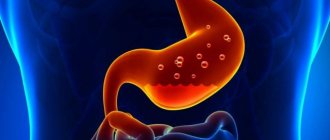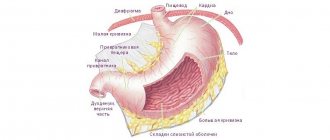Pregnant women have many problems: as soon as toxicosis ends, varicose veins and aching pain in the lower back appear. And for women with gastrointestinal diseases, the health issue is even more acute. After all, it is known that 75% of expectant mothers complain of gastritis during pregnancy. Therefore, the question arises of how to treat the disease. Today we will talk about the impact the disease has on the mother’s condition and the development of the fetus, what drugs can be used to treat gastritis in pregnant women, and what symptoms may bother the expectant mother.
According to statistics, 50% of expectant mothers suffer from exacerbation of chronic diseases of the gastrointestinal tract. And the most common are gastritis and ulcers during pregnancy. From the article you will learn about the causes of these diseases during pregnancy, as well as how to treat them. Can I take medications? What herbs for gastritis should not be consumed during pregnancy?
Causes of gastritis during pregnancy
As a rule, the appearance of gastritis is associated with an exacerbation of inflammatory processes that appeared earlier. There are two types of violation. The first is associated with atrophy of stomach tissue. The second type of disease is associated with infection of the body by Helicobacter pylori. Moreover, it is possible to become infected before or after conception.
Helicobacter pylori in the body
If the infection occurs early or before pregnancy, the disease can be easily missed. Pregnancy and gastritis at the acute stage provoke hormonal imbalance. During pregnancy, treatment is difficult. Many drugs are contraindicated in patients suffering from the disease. If gastritis is not treated during pregnancy, bearing a child will result in complications.
What causes exacerbation of gastritis in the acute stage:
- unbalanced and poor quality nutrition;
- products of dubious quality containing harmful substances - flavorings, stabilizers, preservatives;
- situations leading to stress;
- binge eating.
How to diagnose
Before prescribing treatment for gastritis in pregnant women, the disease will need to be diagnosed. It is necessary to collect detailed information during the initial examination of patients; gastritis and pregnancy have extensive clinical signs. At this time, the woman is worried about:
- frequent stomach rumbling;
- stomach pain;
- nausea;
- stomach upsets;
- flatulence;
- heartburn.
Different forms of the disease exhibit their own symptoms. If exacerbation of gastritis during pregnancy is provoked by increased acidity, pain begins to disturb in the area of the right hypochondrium, navel, and stomach. The state of discomfort intensifies when eating fatty, spicy foods. The pain occurs during sleep and immediately after eating. Treatment of the form is aimed at reducing acid activity.
Symptoms of the disease
Before we talk about safe methods for diagnosing the disease and principles of treatment during pregnancy, it is necessary to describe in detail the main symptoms. These include:
- pain in the upper abdomen;
- spasms occur not only after eating, but also at night and in the morning on an empty stomach;
- upset stomach, which may be accompanied by pain;
- severe toxicosis with profuse vomiting and weight loss;
- frequent heartburn;
- taste of rotten eggs in the mouth.
Known forms of gastritis
The disease has acute and chronic forms. During the period of exacerbation, the disease manifests itself violently. Chronic gastritis during pregnancy is accompanied by a less violent relapse. It is impossible to cure the chronic form. If a person is diagnosed, he will have to come to terms with it.
Acute form of gastritis
In the acute form, the walls of the stomach or intestines become inflamed. There are several causes of the pathology. Chemical, thermal and mechanical damage are common.
Aggravated gastritis during pregnancy occurs in a similar way:
- The epithelium of the mucous membrane is affected.
- Later, the inflammatory process spreads to the entire thickness of the stomach and penetrates the muscle layer.
- The disease manifests itself after illnesses of the liver, gallbladder, and pancreas. More often it begins to worsen after taking medications intended to treat allergies and acute poisoning.
- A sign of gastritis can occur due to metabolic disorders or burns of the mucous membrane.
Symptoms that occur with gastritis
Symptoms in the acute stage appear between four and eight hours. At this time, a person feels weakness, heaviness in the stomach, nausea, vomiting, and diarrhea.
The skin turns pale and sweat appears. There is excessive salivation or dryness in the mouth.
Chronic form of gastritis
Chronic gastritis differs significantly from the acute form. Patients are characterized by stomach pain and intestinal disorders. Symptoms are accompanied by weakness of the body, irritability, and low blood pressure.
In the latter case, toxicosis is severe, lasting seventeen weeks. In some cases, the disease does not manifest itself at all. In the acute form, the woman’s well-being deteriorates sharply, without affecting the fetus. However, treatment should begin immediately after diagnosis.
Restrictions and prohibitions
A diet for gastritis during pregnancy prohibits the consumption of the following foods:
- fatty pork, lamb, duck and goose meat, game;
- rich meat and fish broths;
- concentrated sauces;
- Forest mushrooms;
- cooking oil, margarine;
Fresh garlic, onions, radishes, radishes, cabbage can cause disruptions in the gastrointestinal tract. Sorrel, citrus fruits, sour fruits, bell peppers, and tomatoes are sources of acid, which often causes heartburn in pregnant women.
Pearl barley and legumes provoke bloating and flatulence.
Pickles, canned food, smoked foods, as well as pickled vegetables with a high salt and bite content negatively affect the condition of the mother’s body. This does not have the best effect on the baby’s development.
Factors provoking the disease
There are a number of reasons that contribute to the occurrence of pathology. Favorable factors for the onset of the disease are:
- Frequently recurring stressful situations. Stress can occur at home and at work. This causes sleep disturbances and poor appetite. It is recommended to eliminate the causes of stress and reassure the expectant mother.
- Consumption of harmful foods. Women expecting a child should not eat on the fly, use low-quality food, or eat dry food. Alcohol and cigarettes are strictly contraindicated; the poison harms the body of the mother and the fetus.
- Infection of the body with the bacterium Helicobacter pylori. The bacterium is reported to be able to enter the body before conception. During pregnancy it provokes an acute form of gastritis.
Bacterial infection
Authorized Products
What can pregnant women have with gastritis - only those foods that are approved for consumption.
- Bread. Only wheat, from high grade flour, in dried form.
- Soups. Dairy, vegetable, mucous, in low-fat meat broth. It is useful to add cereals to them.
- Meat. Only lean varieties of beef and veal, rabbit, poultry (chicken, turkey, quail).
- Fish. Low-fat river and sea fish (cod, hake, pelengas, sea bass). Caviar can be consumed in small quantities.
- Dairy products. A glass of whole milk a day is acceptable, only if there are no allergies or intolerances. You can eat non-acidic cottage cheese, kefir, fermented baked milk, and hard low-fat cheeses.
The most useful cereals are buckwheat and oatmeal. Pasta can only be eaten small, from hard varieties.
It is recommended to replace chicken eggs with quail eggs. Use no more than 1-2 pieces per day. hard-boiled.
It is better to eat vegetables during pregnancy boiled or baked. Boiled potatoes, carrots, broccoli, cauliflower, beets, early zucchini and pumpkin will saturate the mother's body with essential vitamins and minerals. The use of butter and refined vegetable oil is allowed.
Fruits can be consumed in unlimited quantities, but you must be aware of an allergic reaction. It is recommended to eat apples and pears not only raw, but also baked.
Moms with a sweet tooth can eat:
Methods for diagnosing gastritis in pregnant women
Before starting treatment, it is advisable to carry out diagnostics in a laboratory. Diagnostics consists of:
- Taking blood for analysis;
- Acidity level measurements;
- Biopsies of affected areas of the stomach. The technique is unpleasant and painful and is prescribed only in extreme cases.
- Helic test, which determines the presence of bacteria causing pathology.
Of course, when establishing an accurate analysis, it is not enough for a gastroenterologist to know the symptoms of the disease. An endoscopy will be required to test gastric juice.
To obtain accurate results, probing is usually done. The procedure is carried out using a special device inserted directly into the stomach.
The device is safe for the developing fetus. Women who are expecting a child do not need to worry. The main thing is to establish a diagnosis and select therapy that can eliminate the acute form of the disease.
The described method accurately determines the diagnosis. With its help, erosion of the stomach walls is established.
The endoscopy procedure is considered a difficult ordeal. But there is no need to go to extremes. The method is used if other methods have failed.
How to treat acute gastritis during pregnancy
After clarifying the diagnosis, an experienced doctor prescribes medications. Treatment of gastritis during pregnancy differs from treatment of an ordinary patient; many medications can harm the fetus.
In the acute form of stomach disease, the gastroenterologist prescribes Maalox, Gastrofarm, Gelusil Lac - a medicine with adsorbing properties. It is recommended to consume approximately two hours after eating. If pain occurs, patients have the right to use medications: papaverine, no-spa, hydrochloride. A medicine that helps eliminate nausea is cerucal.
Proper nutrition
In case of exacerbation, women are prescribed bed rest and an appropriate diet. You should eat multiple meals, about six times a day. Food must be chewed well.
Food is steamed; frying is not recommended. The diet includes limiting salt and carbohydrates (sugar, jams, confectionery). Broths provoke the release of excess juice and are not recommended to be consumed.
The diet includes the consumption of milk and dairy products. Milk soups consisting of cereals are useful for gastritis.
Soft-boiled eggs, meatballs consisting of minced meat or fish, cheese, kefir, vegetable stew, sweet fruits and vegetables are acceptable.
The diet can be diversified with lean, steamed meat. The diet consists of potatoes, fish, doctor's sausage and pasta. In the absence of exacerbation, it is allowed to eat low-fat ham, hard cheese, and not too sour sour cream.
Even without an exacerbation, patients should exclude fried and smoked foods from their diet. These products should be avoided by all pregnant women without exception, not only those suffering from gastritis.
The diet begins with the consumption of dairy products - cheese, milk soups and liquid cereals. Eat in small portions. After a few hours, boiled eggs and vegetable stew are introduced into the diet. Later, meat products, mashed potatoes, various cereals, and non-acidic sour cream are added to the diet. There is no need to add butter to noodles or potatoes.
Is it possible to cure gastritis with mineral waters?
If the limbs do not swell and the acidity level is increased, it is permissible to add mineral water to the diet. An example is “Smirnovskaya” water or “Borjomi”. You should take three hundred milliliters at least three times a day. Women with low acidity are allowed to drink Essentuki water No. 4 or 17.
How to cure gastritis with herbs
Treatment of the disease is possible not only with the help of drugs. Herbs will help eliminate unpleasant symptoms.
St. John's wort, chamomile or mint are most suitable. You can steam flax or oat seeds. The most common sedatives are motherwort, celandine, and valerian.
The vast majority of medicinal plants have an anti-inflammatory effect on the mucous membrane. Among the plants noted are thyme, wormwood, plantain, and parsnip.
It is worth noting that for gastritis with reduced secretory function, medicinal substances with anti-inflammatory properties are used. Before taking herbs, you need to consult a doctor! The body of pregnant women can respond to therapy in unexpected ways.
Proper nutrition
An appropriate diet is the key to speedy subsidence of symptoms and relief of the patient’s condition. In addition, a diet with a predominance of proteins in an easily digestible form, a decrease in simple carbohydrates, an increase in the proportion of boiled and steamed vegetables, and baked fish is extremely beneficial for a pregnant woman and her gastrointestinal tract.
Vegetables in this diet are allowed with low fiber content, which do not complicate the digestion of food. For culinary processing, boiling, stewing or steaming is recommended
What to do to prevent the disease
Effective prevention lies in proper nutrition. Food should be consumed in small portions, about five times a day. It is recommended to chew long and thoroughly before swallowing food. Overeating has a negative impact on patients diagnosed with gastritis. Frequent consumption of food irritates the mucous membrane and stretches the stomach.
It is important that women exclude strong broths, seasonings, smoked foods, and preserves from their diet. During an exacerbation and after a relapse, avoid strong tea, coffee, and carbonated water.
You should always remember that systematic stress and alcohol abuse provoke the onset of the disease and have a negative effect on the fetus.
Sample menu
Approximate daily diet.
- Breakfast. Oatmeal with dried fruits, warm tea.
- Snack. Baked apples, jelly.
- Afternoon snack. Salad of boiled vegetables, a slice of bread with butter, cottage cheese/cheese.
- Dinner. Steamed meatball with buckwheat, steamed vegetables, dried fruit compote.
- Snack. A small amount of walnuts, marmalade, fruit mousse.
- Dinner. Light vegetable soup with wheat cereal.
If there are no contraindications, then you can drink a glass of kefir before going to bed.
A consultation with a nutritionist will help determine what pregnant women can do with gastritis. He will help you create a menu that will ensure an easy pregnancy without compromising the development of the baby.
The material was prepared specifically for the website kakrodit.ru, edited by doctor M.L. Pavlenko. Specialty: obstetrician-gynecologist of the highest category.
source










